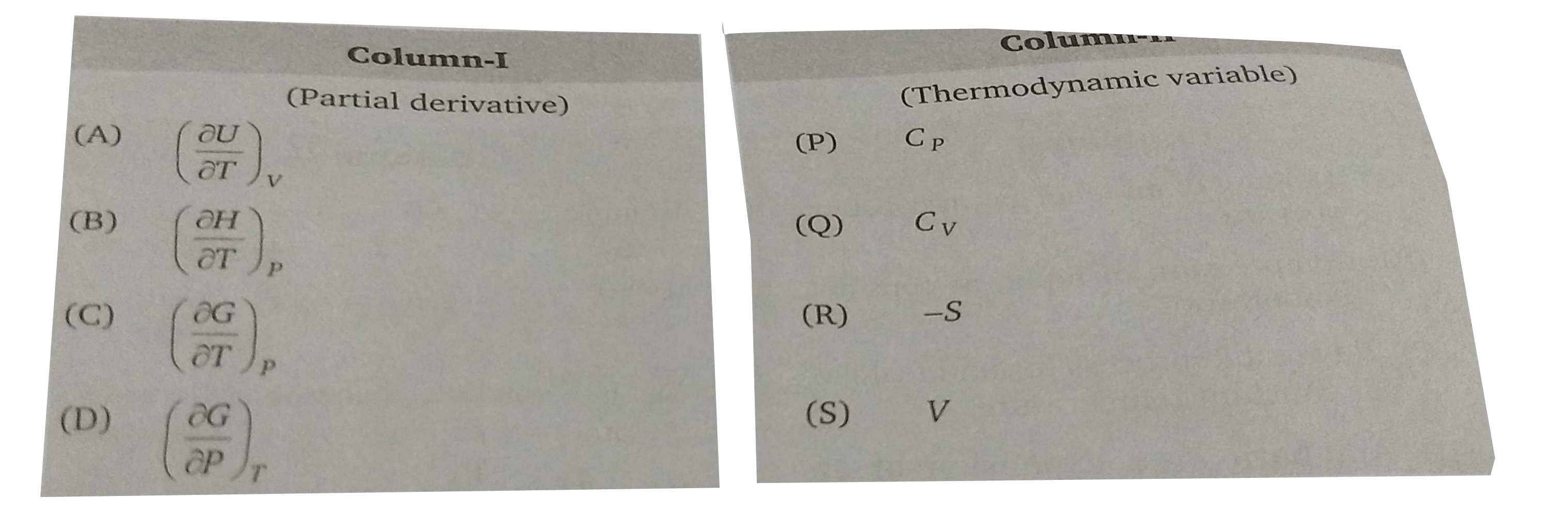Determine the enthalpy of formation of B2H6(g) in kJ/mol of the following reaction :
B2H6(g)+3O2(g)→B2O3(s)+3H2O(g),
Given : ΔrH∘=−1941 kJ/mol, ΔH∘f(B2O3,s)=−1273 kJ/mol,
ΔH∘f(H2O,g)=−241.8 kJ/molSolution in Punjabi
−75.6
+75.6
−57.4
−28.4
The correct Answer is:C
−1941=−1273+3(−241.8)−(ΔfH)B2H6
(ΔfH)B2H6=−1273−725.4+1941=−57.4
Topper's Solved these Questions
- BOOK - NARENDRA AWASTHICHAPTER - THERMODYNAMICSEXERCISE - Level 3 - One Or More Answers Are Correct1videos
THERMODYNAMICS
- BOOK - NARENDRA AWASTHICHAPTER - THERMODYNAMICSEXERCISE - Level 3 - Match The Column2videos
THERMODYNAMICS
- BOOK - NARENDRA AWASTHICHAPTER - THERMODYNAMICSEXERCISE - Level 2 (Q.1 To Q.30)1videos
THERMODYNAMICS
- BOOK - NARENDRA AWASTHICHAPTER - STOICHIOMETRYEXERCISE - Level 3 - Subjective Problems20videos
STOICHIOMETRY
Similar Questions
Assume ideal gas behaviour for all the gases considered and neglect vibrational degrees of freedom. Separate equimolar sample. Separate equimolar samples of Ne, O2 , CO2 and SO2 were subjected to a two process as mentioned. Initially all are at same state of temperature and pressue.
Step I → All undergo reversible adiabatic expansion to attain same final volume, which is double the original volume thereby causing the decreases in their temperature.
Step → After step I all are given appropriate amount of heat isochorically to restore the original temperature.
Mark the correct option(s) :02:33View SolutionMatch the following columns
 04:02View Solution
04:02View SolutionWrite structure of 2,2-dimethylheptane.
03:15View SolutionWhat volume of a liquid (in L) will contain 10 mole ? If molar mass of liquid is 280 and its density is 1.4 g/mL.
02:37View SolutionDiborane is a potential rocket fuel which undergoes combustion according to the reaction, B_(2)H_(6) (g) + 3O_(2) (g) rarr B_(2) O_(3) (s) + 3H_(2) O (g) From the following data, calculate the enthalpy change for the combustion of diborane: (i) 2 B (s) + ((3)/(2)) O_(2) (g) rarr B_(2) O_(3) (s) , Delta H = 0 1273 k J//mol (ii) H_(2) (g) + ((1)/(2)) O_(2) (g) rarr H_(2) O (l), Delta H = -286 kJ//mol (iii) H_(2) O (l) rarr H_(2)O (g) Delta H = 44 kJ//mol (iv) 2B (s) + 3H_(2) (G) rarr B_(2) H_(6) (g), Delta H = 36 kJ//mol
View SolutionDetermine the enthalpy of formation of B_(2)H_(6) (g) in kJ/mol of the following reaction : B_(2)H_(6)(g)+3O_(2)(g)rarrB_(2)O_(3)(s)+3H_(2)O(g) , Given : Delta_(r )H^(@)=-1941 " kJ"//"mol", " "DeltaH_(f)^(@)(B_(2)O_(3),s)=-1273" kJ"//"mol," DeltaH_(f)^(@)(H_(2)O,g)=-241.8 " kJ"//"mol"
03:28View SolutionGiven C_(2)H_(2)(g)+H_(2)(g)rarrC_(2)H_(4)(g): DeltaH^(@)=-175 " kJ mol"^(-1) DeltaH_(f(C_(2)H_(4),g))^(@)=50 " kJ mol"^(-1), DeltaH_(f(H_(2)O,l))^(@)=-280 " kJ mol"^(-1), DeltaH_(f(CO_(2)g))^(@)=-390 " kJ mol"^(-1) If DeltaH^(@) is enthalpy of combustion (in kJ "mol"^(-1) ) of C_(2)H_(2) (g), then calculate the value of |(DeltaH^(@))/(257)|
02:33View SolutionDiborane is formed the element as shown in equation (1) 2B(s) + 3H_(2)(g) rarr 3B_(2)H_(6)(g)"…….."(1) Given that {:(H_(2)O(l)rarrH_(2)O(g),DeltaH_(1^(@))=44kJ),(2B(s)+3//2O_(2)(s)rarrB_(2)O_(3)(s),DeltaH_(2^(@))=-1273kJ),(B_(2)H_(6)(g)+3O_(2)(g)rarrB_(2)O_(3)(s)+3H_(2)O(g),DeltaH_(3^(@))=-2035 kJ),(H_(2)(g)+1//2O_(2)(g)rarrH_(2)O(l),DeltaH_(4^(@))=-286kJ):} the DeltaH^(@) for the reaction (1) is -
02:33View SolutionFind the bond enthalpy (in kJ/mol) of one "three centre two electron bond" in B2H6{B−H−B→2B(g)+H(g)} from the given data.
ΔH∘f[BH3(g)]=100 kJ/moleΔH∘f[B2H6(g)]=36 kJ/moleΔHatm[B(s)]=565 kJ/moleΔHatm=[H2(g)]=218 kJ/moleView SolutionCalculate the DeltaH_(f)^@ of C_(6)H_(12)O_(6) (s) from the following data: DeltaH_(comb)[C_(6)H_(12)O_(6)(s)]=-2816.kJ//mol DeltaH_(f)^(@) of CO_(2)(g)=-393.5kJ//mol DeltaH_(f)^(@) of H_(2)O(l)=-285.9kJ//mol
02:35View SolutionDiborane is a potential rocket fuel which undergoes combustion according to the reaction,
B2H6(g)+3O2(g)→B2O3(s)+3H2O(g)
From the following data, calculate the enthalpy change for the combustion of diborane:
(i) 2B(s)+(32)O2(g)→B2O3(s),ΔH=01273kJ/mol
(ii) H2(g)+(12)O2(g)→H2O(l),ΔH=−286kJ/mol
(iii) H2O(l)→H2O(g)ΔH=44kJ/mol
(iv) 2B(s)+3H2(G)→B2H6(g),ΔH=36kJ/molView SolutionDiborane is a potential rocket fuel which undergoes combustion according to the reaction,
B2H6(g)+3O2(g)→B2O3(s)+3H2O(g)
From the following data, calculate the enthalpy change for the combustion of diborane:
(i) 2B(s)+(32)O2(g)→B2O3(s),ΔH=01273kJ/mol
(ii) H2(g)+(12)O2(g)→H2O(l),ΔH=−286kJ/mol
(iii) H2O(l)→H2O(g)ΔH=44kJ/mol
(iv) 2B(s)+3H2(G)→B2H6(g),ΔH=36kJ/molView SolutionFrom the following data at 25^(@) C {:("Reaction" ,, Delta_(r) H^(@) kJ//mol) , ((1)/(2) H_(2) (g) + (1)/(2) O_(2) (g) to OH (g) ,, 42), (H_(2) (g) + (1)/(2) O_(2) (g) to H_(2) O (g) ,, -242), (H_(2) (g) to 2 H (g) ,, 436) , (O_(2) (g) to 2 O(g) ,, 495):} Which of the following statement(s) is/are correct : Statement(a) : Delta_(r) H^(@) for the reaction H_(2) O (g) to 2 H(g) + O(g) is 925 kJ/mol Statement (b) : Delta_(r) H^(@) for the reaction OH(g) to H_(2) (g) + O(g) is 502 kJ/mol Statement(c) : Enthalpy of formation of H(g) is – 218 kJ/mol Statement(d) : Enthalpy of formation of OH(g) is 42 kJ/mol
06:53View SolutionCalculate standard free energy change from the free energy of formation data for the following reaction, C6H6(l)+152O2(s)→6CO2(g)+3H2O(g).
ΔfGθ[C6H6(l)]=172.8 kJ/mol
ΔfGθ[CO2(g)]=−394.4 kJ/mol
Given that. ΔfGθ[CO2(g)]=394.4 kJ/mol
ΔrGθ[H2O(l)]=−228.6 kJ/mol02:10View SolutionDiborane is a potential rocket fuel with undergoes combustion according to the reaction B_(2)H_(6)(g) + 3O_(2)_(g) to B_(2)O_(3)(s) + 3H_(2)O(g) From the following data, calculate the enthalpy change for the combustion of diborane. 2B(s) + 3/2O_(2)(g) to B_(2)O_(3)(g), DeltaH = -1273 kJ "mol"^(-1) ........(1) H_(2)(g) + 1/2O_(2) (g) to H_(2)O(l), DeltaH = -286 kJ"mol"^(-1) .........(2) H_(2)O(l) to H_(2)O(g), DeltaH= 44 kJ "mol"^(-1) H_(2)O(l) to H_(2)O(g), DeltaH = 44 kJ "mol"^(-1) .........(4) 2B(s) + 3H_(2)(g) to B_(2)H_(8)(g), DeltaH = 36 kJ"mol"^(-1) ............(5)
03:05View SolutionDiborane is a potential rocket fuel which undergoes combustion according to the reaction:
B2H6(g)+3O2(g)→B2O3(s)+3H2O(g)
From the following data, calculate the enthalpy change for the combustion of diborane.
2B(s)+32O2(g)→B2O3(s)ΔH=−1273kJmol−1
H2(g)+12O2(g)→H2O(l)ΔH=−286kJmol−1
H2O(l)→H2O(g)ΔH=44kJmol−1
2B(s)+3H2(g)→B2H6(g)ΔH=36kJmol−1.03:28View Solution

